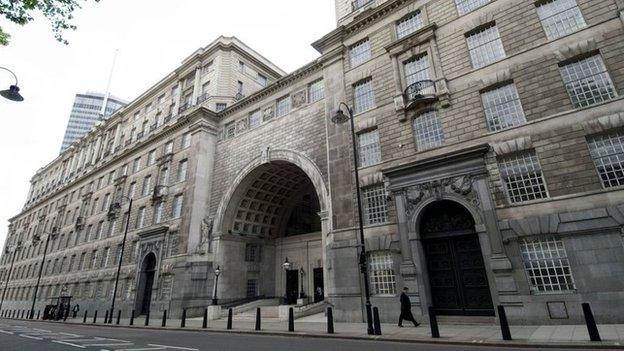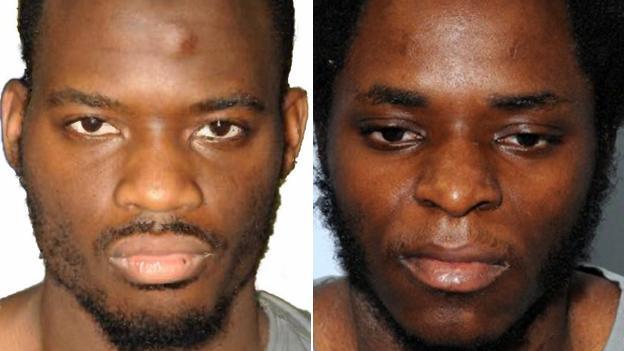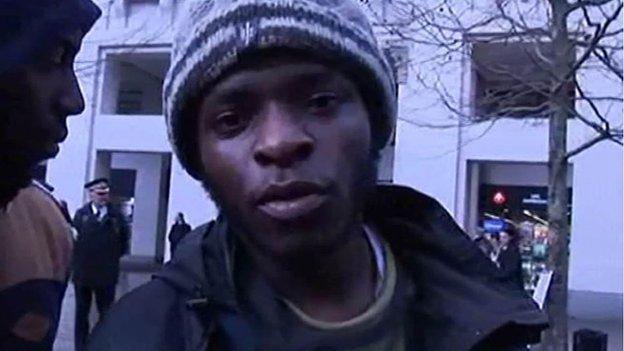Lee Rigby murder: What MI5 knew about Woolwich killers
- Published

The headquarters of MI5, whose role in investigating the killers is scrutinised in the report
Although a report into the death of Fusilier Lee Rigby found it could not have been prevented, questions have been raised about the role of the security services, in particular MI5.
There were errors in seven different agency operations before the attack involving Michael Adebolajo and Michael Adebowale between 2009 and Lee Rigby's murder in May 2013 where processes were not followed, decisions not recorded or delays encountered, it says.

Michael Adebolajo and Michael Adebowale were both given lengthy jail terms
Below are some of the key dates from the investigations into both men published in the Intelligence and Security Committee's report.
Michael Adebolajo
May 2008: First identified by MI5. An "investigative record" was opened.
2009-10: Occasional indirect coverage of Adebolajo as a result of his contact with another person of interest to MI5.
21 November 2010: Arrested in Kenya by Kenyan authorities with a group of other individuals, assessed to have been attempting to travel to Somalia to join Islamist militant group al-Shabab. MI5 opened a trace on him when informed of the arrest the next day.
25 November 2010: Adebolajo arrived back in the UK, having left Kenya voluntarily, and was interviewed by SO15 - the Met Police's counter terrorism unit - under schedule 7 of the Terrorism Act 2000.
April 2011: Operation created to focus on Adebolajo's involvement in extremist activity. Initial inquiries made to confirm where he was living.
14 April 2011: MI5 linked Adebolajo to a GCHQ report from January 2010 which listed the historic contacts (between 2008 and 2009) of an individual of interest who later became a high profile and senior figure from al-Qaeda in the Arabian Peninsula. The content of this communication was not sought.
9 May 2011: Urgent application made for further "intrusive" coverage, such as intercepting phone calls, against Adebolajo.
21 July 2011: Surveillance indicated that Adebolajo had met a subject of interest investigated for radicalising UK-based individuals and facilitating their travel overseas.
August 2011: MI5 passed intelligence to the police regarding Adebolajo's possible intention to be involved in the London riots. In the event, Adebolajo was not arrested. MI5 also contacted the National Terrorist Financial Investigative Unit, suspecting Adebolajo was engaged in fraudulent activity. No evidence of fraud was discovered.
September 2011 - October 2012: MI5 commissioned an internal report to summarise what was known about Adebolajo's activities. This noted there was no indication he was currently involved in extremist activities. MI5 cancelled their coverage and planned to close the investigation.
November 2012 - May 2013: "Intrusive" coverage of Adebolajo reinstated. But no security threat was identified, and investigations indicated that Adebolajo was spending most of his time involved in drug dealing.
February - April 2013: MI5 notify SO15 of their belief that Adebolajo was involved in drug dealing. They in turn channelled this information to the local police. However, the house number was accidentally omitted and no further action was taken.
11 April 2013: "Intrusive" coverage of Adebolajo cancelled.
22 May 2013: Fusilier Lee Rigby murdered.
Michael Adebowale

August 2011: Adebowale identified by GCHQ as having shown an interest in extremist material online.
April 2012: An "investigative record" is opened. Telephone analysis showed that Adebowale had been in contact with subjects of interest. Counter Terrorism Command (SO15) and the Welsh Extremism and Counter-Terrorism Unit conducted enquiries into Adebowale. No trace of current involvement in extremist activity was found.
June 2012: MI5 closed its investigation into Adebowale. It assessed he did not pose a current threat to UK national security.
September 2012: Adebowale identified by GCHQ as having been referred to as a "lone wolf" in monitored online comments.
25 January 2013: Decision to create investigation into Adebowale was endorsed by MI5 management team.
January-February 2013: Adebowale's online activity was reviewed and revealed he had been in contact with another person of interest.
13 March 2013: Intelligence indicated Adebowale had sought to disseminate extremist material. This was a possible offence; potential executive action was considered.
19 April 2013: MI5 and SO15 agreed to build further coverage of Adebowale in order to form a better assessment of how to disrupt him and manage any risk.
26 April 2013: Application drafted for further "intrusive" techniques against Adebowale. Several revisions to the draft were subsequently discussed and made in order to meet statutory and policy requirements.
21 May 2013: Revised application was approved by a senior manager and MI5's deputy director general. Final draft sent to the Home Office as a routine application.
22 May 2013: Fusilier Lee Rigby murdered. The home secretary signed the submission as an urgent application.